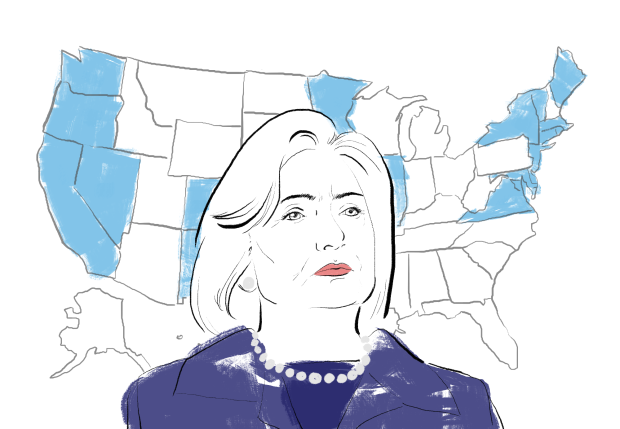This column may contain strong language, sexual content, adult humor, and other themes that may not be suitable for minors. Parental guidance is strongly advised.
“There’s a special place in hell for women who don’t help each other,” former US Secretary of State Madeleine Albright first declared some 25 years ago when she was the U.S. Ambassador to the United Nations.
She has uttered these words countless times since, usually eliciting “applause, nodding heads, and laughter.” When she said them again earlier this year at a campaign event for Hillary Clinton, the statement went viral and, elicited considerable backlash, as it was widely interpreted as a threat to all women to support Hillary Clinton—or else.
However, Albright wrote in a New York Times op-ed piece, “I absolutely believe what I said, that women should help one another, but this was the wrong context and the wrong time to use that line. I did not mean to argue that women should support a particular candidate based solely on gender. But I understand that I came across as condemning those who disagree with my political preferences. If heaven were open only to those who agreed on politics, I imagine it would be largely unoccupied.”
“However, I do want to explain why I so firmly believe that, even today, women have an obligation to help one another. In a society where women often feel pressured to tear one another down, our saving grace lies in our willingness to lift one another up. And while young women may not want to hear anything more from this aging feminist, I feel it is important to speak to women coming of age at a time when a viable female presidential candidate, once inconceivable, is a reality.”
Sadly, as we now know, a significant swathe of the female voting population chose not to help Hillary Clinton in her failed bid for the presidency. She would have been the first female president of a world’s superpower—her victory had in fact been a foregone conclusion, until of course, the events of Nov. 9, 2016 delivered a stunning upset and thrust the least qualified and shockingly inept candidate whose preferred after-shave reeked with the stench of every deplorable –ism one could think of: racism, sexism, nativism, narcissism, anti-intellectualism, ableism, to name a few.
That Hillary Clinton won heavily among African-American, Latino, and Asian-American women was largely expected; Trump’s rhetoric of hate, mockery, and misogyny was targeted in large part towards minorities. But what was particularly shocking and saddening was that 53 percent of white women actually voted for Trump, even when it was clear that a vote for him was a vote against their own interests.
In the many post-election dissections since, the treachery of these women is often pointed out. After all, this was—and still is—a man who showed scant respect for women despite his own protestations to the contrary. This was—and still is—a man who believed women should be punished for seeking an abortion. This was—and still is—a man who blatantly objectified women and equated their value to their looks. This was a man who believed grabbing a woman by the pussy was every red-blooded (and white) male’s birthright.
And this is a man whom they chose over a woman vastly more qualified, vastly more aware of the needs to fight for greater equality for women, and vastly more invested in the value of women as equal partners in a functioning, healthy, and progressive society.
To vote in as president a man who, in all his angry racism and vitriol and resentment, represents the last gasp of white privilege in the United States after eight years under the first truly feminist president, is a bewildering step back. To put race before gender is a slap on the face of all her fellow women, be they of color of not. Understandable, but nevertheless, a slap on the face.
They did not, as has often been pointed out in the press, most famously by Susan Sarandon, vote with their vaginas, but as an act of self-preservation, the self being white, entitled, and privileged.
Robin Morgan, writing in The Guardian, noted that the results of the election was “the diseased patriarchy” in “a battle to the death with women.”
For those lamenting that this was not the America they know, Kate Harding, also in The Guardian, called bullsh*t.
“This is absolutely the America I know. My country is racist, xenophobic, fearful, and ignorant. My country hates women, which is bad enough, and pretends it doesn’t, which is worse. Having supported Hillary Clinton in both 2008 and 2016, I am well aware that enormous chunks of the left—let alone the rusted-out, heavily armed right—loathe her beyond all reason. For the last 25 years, I’ve watched everyone from trash tabloids to the New York Times to the director of the FBI work to assassinate Clinton’s character. I have watched people I used to respect buy into every lie ever printed about her, rather than confront their own discomfort with ambitious and powerful women.”
There’s still a socially-accepted hostility to women being in charge, wrote Matt O’Brien in the Washington Post, rooted in “the fear that this would make a man not a man, and a feeling that women shouldn’t even try to act like men.” Again this goes back to that perennial double standard: men with ambition are admired and desired; women with ambition are immediately suspect and “unfeminine.”
Proof of this was all the vitriol heaped on Hillary Clinton by Trump supporters, not for her stance on, say, the Trans-Pacific Partnership, or her strategy to counter the threat of ISIS. No, their T-shirts and placards were pure, naked, unadulterated, and shameful misogyny: “Lock Her Up,” “Trump That Bitch,” “Hillary Sucks But Not Like Monica,” and “Don’t Be a Pussy.”
While clearly aimed at Hillary Clinton, one has to wonder, do these men—and some women—really talk about women this way?
In Trump’s America, yes.
Having said that, the one bright spot in what was otherwise a disheartening week for me, was a message from a, shall we say, would-be lover. Our various attempts to meet up over the course of the past few months seemed to be constantly thwarted. On the eve of the elections, when the stars seemed to have finally aligned, he was taken ill.
The next day he sent me a message, to the effect that if he had known that it was the end of the world, “we should have f*cked each other to death last Monday.”
I suppose with Trump as president, the world is still ending, and so there is time.
B. Wiser is the author of Making Love in Spanish, a novel published earlier this year by Anvil Publishing and available in National Book Store and Powerbooks, as well as online. When not assuming her Sasha Fierce alter-ego, she takes on the role of serious journalist and media consultant.
For comments and questions, e-mail [email protected].
Disclaimer: The views expressed here are solely those of the author in her private capacity and do not in any way represent the views of Preen.ph, or any other entity of the Inquirer Group of Companies.
Art by Dorothy Guya
Follow Preen on Facebook, Instagram, Twitter, Snapchat, and Viber



